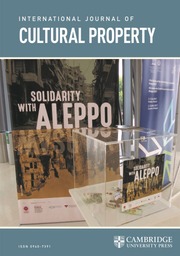Article contents
The Current State of the Antiquities Trade: An Art Dealer’s Perspective
Published online by Cambridge University Press: 02 September 2019
Abstract:
The antiquities trade is the subject of contentious debate. The anti-trade position stems from a long unquestioned stance within academia that private ownership of antiquities inherently results in archaeological site destruction and the loss of valuable data. However, there is little data to support this notion. It also ignores the enormous contributions to our shared knowledge of the past that have been made through art collecting and museum acquisitions. The narrative that the destruction of ancient sites is directly tied to Western demand for ancient art is overly simplistic. Despite the ongoing destruction in the Middle East and North African region, virtually no artifacts from there have entered the Western trade in recent years. Opportunistic treasure hunting by desperate locals and intentional destruction of ancient objects for religious reasons cannot be curtailed by increased legislation in Western nations. Fetishizing mundane ubiquitous antiquities as sacrosanct objects of great national importance that must be retained within modern borders in a globalized world and demanding criminalization of the legitimate international art trade are counterproductive. In many archaeologically rich countries, antiquities are regarded as items to sell to foreigners at best or sacrilegious objects to be destroyed at worst. The free trade in cultural objects is itself an institution that needs to be protected. An open legitimate trade in antiquities is now more than ever necessary to ensure the preservation and dissemination of worldwide cultural property.
Keywords
- Type
- Article
- Information
- Copyright
- Copyright © International Cultural Property Society 2019
References
BIBLIOGRAPHY
- 7
- Cited by


